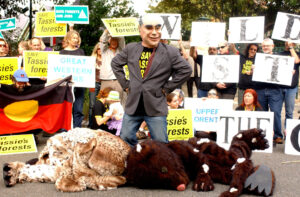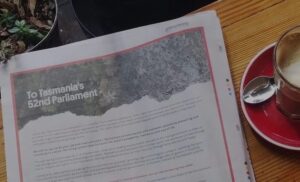The anti-protest laws that have swept the country are a threat to us all, even if you’ve never attended a protest in your life. Governments are writing and passing laws which authorise companies to legally cause harm to our community and environment, while jailing individuals seeking to stop such harm through non-violent protest.
The draconian jail sentence handed down to climate protestor Violet Coco is grossly disproportionate and should ring alarm bells for anyone concerned about living in a free and fair democracy.
Coco was part of a protest that stopped one lane of traffic on the Sydney Harbour Bridge for 28 minutes and she has been sentenced to jail for 15 months and refused bail. Jail is supposed to be a last resort, but this is a harsh sentence that would usually be reserved for breaching an AVO, or for serious and repeated property and theft offences. For comparison, a Canberra man was recently sentenced to 15 months jail for his role in kidnapping, beating and waterboarding another man over a dispute about missing drugs. Violet Coco was peaceful and didn’t physically harm anyone yet received a similar sentence. Are we really content to be a country that doles out prison sentences for the crime of mildly inconveniencing people?
No matter if you support or oppose their methods, non-violent protest can be an act of community service. Like the pain signals our brain sends us when we are injured – protest is one way we know there is an injury to our community or to our natural environment that needs to be stopped or repaired.
Draconian anti-protest laws have now been passed in several states including New South Wales, Victoria and more recently Tasmania. The laws have passed with the support of both the Labor and Liberal parties and are mainly targeted at environmental and climate protestors, though you can bet that governments won’t stop with environmental protestors.
The purpose of these anti-protest laws is not to protect the community, but to limit the right to protest and to protect business interests above democratic interests. In its submission on Tasmania’s new anti-protest laws, the Australia Institute Tasmania, said: “[The law] continues to preference businesses’ ability to carry out work over the right of people to protest by giving broad powers to police to arrest peaceful protestors and imposing harsh penalties”.
Tasmania’s laws could see a community member protesting the destruction of old growth forests on a forestry site face a penalty of over $13,000 or two years in prison. Obstructing a business while trespassing risks one year imprisonment. These are similar penalties to those who trespass while holding a gun, drug another person or perpetrate aggravated assault. Under Tasmania’s new laws, holding a placard will be treated roughly the same as holding a gun.
We know these laws aren’t passed to protect the interests of the Australian community because while Violet Coco is going to jail for causing a temporary traffic jam, companies that cause real and lasting damage to the environment and the community get away virtually scot free.
For example, no executive from Rio Tinto went to jail for permanently destroying 46,000 years of world history and heritage in the Juukan Gorge rock shelters.. No coal company executive has ever been jailed for helping to cause climate change, which is turbo-charging the extreme weather events wreaking havoc and billions of dollars in damages upon communities across the country every year. Australia has one of the worst extinction rates for mammals, yet for decades we have chosen to exempt native forest logging from our national environmental laws that are supposed to protect threatened species, something the federal Labor government is now seeking to rectify. Companies are routinely authorised by governments to cause harm to community and to our natural environment while individuals are punished for peacefully protesting to stop such harms.
Often it is governments that impose harms on the community. Until the Freedom Rides of the 1960s, public pools were still segregated in parts of Australia, prohibiting Aboriginal people from swimming with white people. Homosexuality was a crime in Tasmania until 1997 when years of protest resulted in gay law reforms, and let us not forget equal marriage has only been legal for five years. And former Greens Leader Bob Brown was once shot at during protests against logging at Tasmania’s Farmhouse Creek and he was arrested again this year, fighting the same fight to protect Australia’s forests.
Whether it be the struggle for basic human rights, like the abolition of slavery, women’s suffrage and the fight for equal marriage, or to struggle to protect our natural world from destruction, like the battle to end whaling in the Southern Ocean, or to stop the destruction of the Amazon rainforest—many just causes are radical until they become inevitable.
The Franklin River blockade saw around 1500 people arrested and 600 jailed, including Bob Brown who spent 19 days in Risdon Prison. But the day after his release in 1983, he was elected as the first Green in Tasmania’s Parliament. The Franklin River flows freely today thanks to those protestors. Australians owe a debt of gratitude to all those protestors who have been willing to risk jail to stand up for what’s right. But just because protestors are willing to risk jail, does not make harsh jail sentences for protests any less draconian or anti-democratic.
Some people may not agreewith the methods of climate protestors, but causing a traffic jam is hardly a reason to send someone to jail for more than a year. Especially not when climate change is fuelling extreme weather events that are severely impacting Australians across the country. It is imperative that all of us fight to repeal the anti-democratic laws that have been passed by state governments around the country. Because the reality is that the right to peacefully protest is as fundamental to a healthy democracy as free and fair elections.
Between the Lines Newsletter
The biggest stories and the best analysis from the team at the Australia Institute, delivered to your inbox every fortnight.
You might also like
Who’s going to stand up and make Nazis ashamed again?
A “March for Australia” rally sounds benign, but people who plan to attend the “March for Australia” rallies around the country on Sunday will almost certainly be marching alongside white supremacists and neo-Nazis.
Open Letter to the Tasmanian Government
The Australia Institute and 30 other organisations from around Tasmania have published an open letter with 10 asks for the environment from whomever forms Tasmania’s next government. When cross-benchers and major parties have struck successful power-sharing agreements elsewhere, they covered policy as well as procedure, making now the ideal time for progress.


